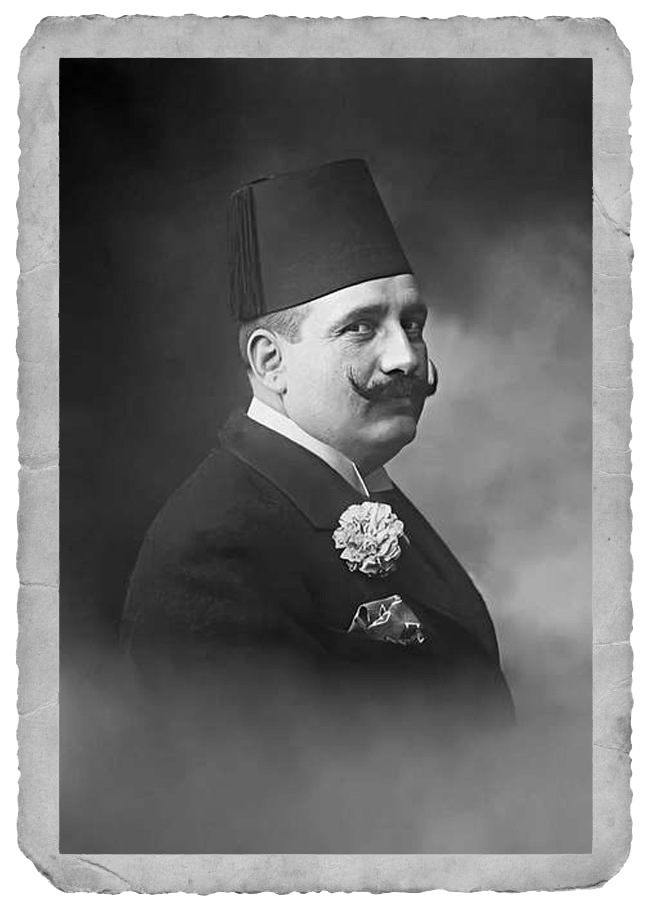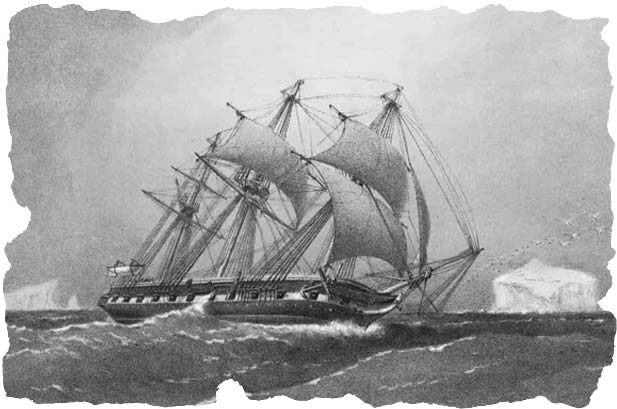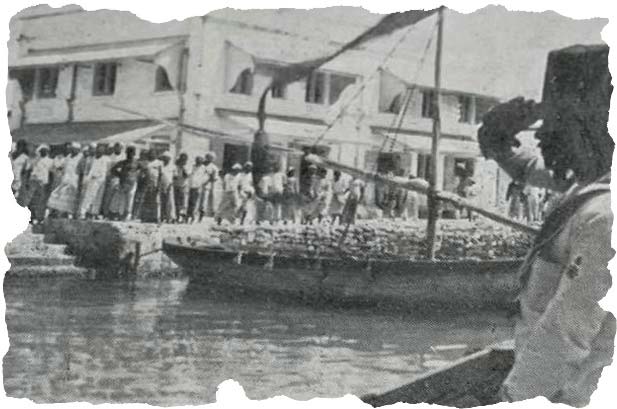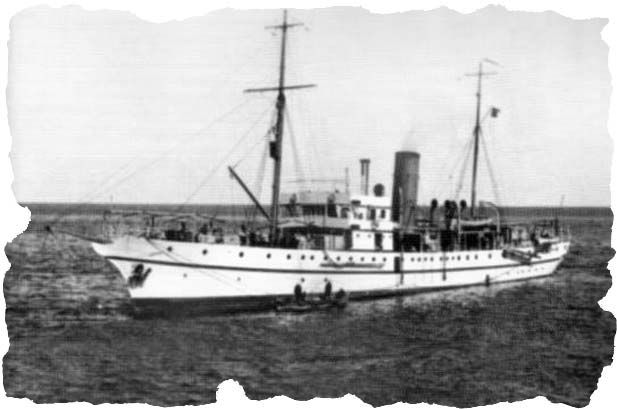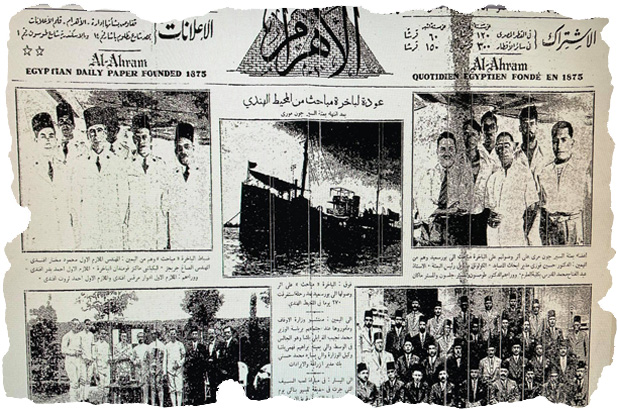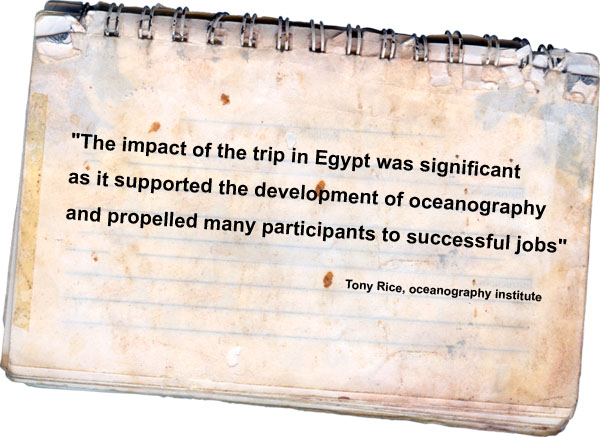As soon as the ship move, everyone divided left and right, their Egyptian and English voices intertwined with the "crackling" of the woods. They packed their bags in the tight cabins, and arranged the tools and equipment in the middle.
After that, "Fawzi", the 33-year-old Alexandrian, met Seymour Sowell (head of the expedition and director of the Natural History Museum of India), who is twenty years older than him, and "Thompson", "McCann" and "Gilson" (professors at Cambridge University), and Abdel Fattah Mohamed (Teacher at the Faculty of Science at the Egyptian University), and Captain McKenzie (Commander) to review the trip's stations and locations with their numbers.
Forty people aboard the small "Mabahiss" differ in everything. That seems clear from their faces and talking, but perhaps what unites them other than the ship is that not realizing how they feel at this moment. They are afraid and excited at the same time.
First, they passed quickly through Port Said, then Suez, then Hurghada, where they went to the “Aquatic station”, hosted by "Crossland" (Station manager).
Mabahiss" will leave its mark on the mind of this man, and he may have wished to be among its crew. That will appear later.
Aden - Bab al-Mandab - September 22
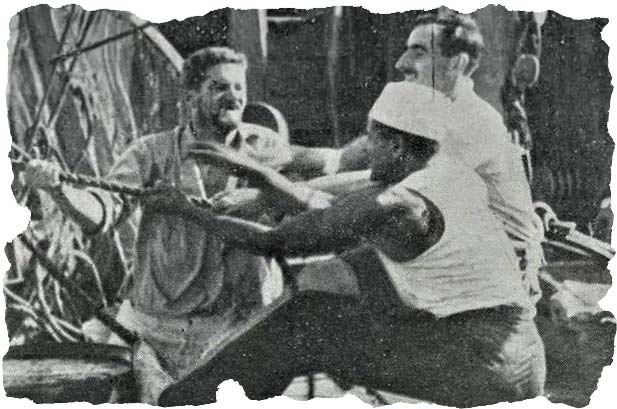
In the evening, “Mabahiss” headed towards Aden, then its first research area, "Bab al-Mandab" in the Red Sea.
The first stop is always the hardest. The tension is visible on everyone, whether the professors in well-dressed shirts, or the bare-breasted sailors who put the “cap” on their heads... It is a moment in which each of them recognizes the work of the other. Those standing on the cranes holding the ropes, and the others carrying scientific tools and devices have to mix and cooperate.
The atmosphere around them was not at all comfortable. "Mabahiss" deck was crowded with equipment. It was filled with three times more than its capacity, and it carried extra coal; So they ate their food in two batches due to the small space of the dining room and their movement was difficult and often dangerous.
Only Hussein Fawzi was thinking about something else. He said in one of his letters to the administration in Egypt: "I was afraid of the behavior of those on the ship...those people who had no common nationality, culture or language”.

Despite all this, the first station passed successfully, and the required samples were collected on time. But the ship faced its first problems after leaving. Where the refrigeration device broke down and the fish and meat were spoiled and they threw them into the sea. For a while, their food depended on vegetables only.
And when Engineer Girgis (Ship's engineer) tried to fix it, he inhaled "methyl chloride" gas, and he remained asleep in a state of anesthesia. This forced "Fawzi" to change their schedule and return to Aden again, as "Girgis" stayed in her hospital for three days.
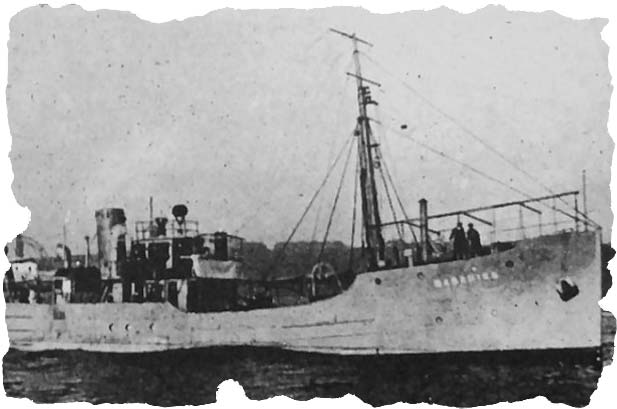
Gulf of Aden - 2 October
"Mabahiss" sailed again, heading to several points in the Gulf of Aden near the African coast, then it went to the width of the Indian Ocean, and returned to the Gulf again near the coast of the Arabian island. The small ship has always needed care, so they returned it to Aden, where its carpenter could repair its body as possible, and an engineer could examine the "winch drum" that was damaged as a result of the speed that “Mabahiss” couldn’t bear.
The weather was nice in this trip, especially in the ocean, but they found other difficulties due to the lack of food and its badness. The Food contains the meat of a few weak sheep, which they took alive on the deck of the ship, to slaughter a head of it every two days.
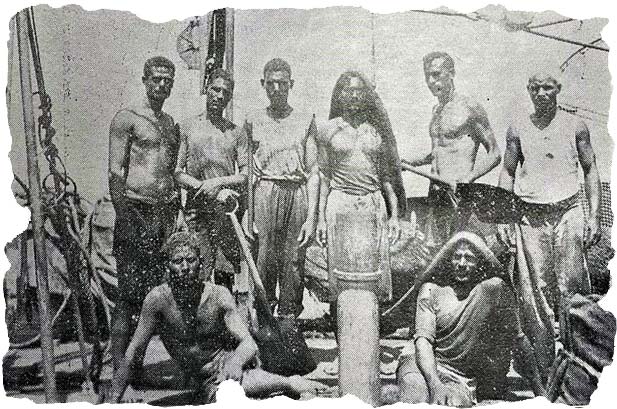
Karachi - 10 November
The crew endured all of this. They had hard nights. Upon their arrival at the port of Karachi (the largest city in Pakistan), the faces of the Egyptian workers were all dusty with coal, but they remained smiling. At that point, all of Fawzy's fear of their behavior disappeared. He says that they "been patient, obedient to orders, organized, and endured poor food and hardship."
The officers and engineers rotated four-hour shifts tirelessly. The laboratories' activity increased as more samples were brought in, so that "Fawzi" worked a lot with his hands. That is why, he considered "the Aden-Karachi trip to be their most fortunate yet".
And he says in his messages from there: "If the following voyages proceeded in this way, it will be said that John Murray's expedition was one of the greatest, most active and most productive voyages."

The pace of work in "Mabahiss" accelerated at the Gulf of Aden and the Arabian Sea. Perhaps this overshadowed the feelings of its crew and their impact of alienation and separation from their families for two months. Everyone was waiting for the moment to go to bed to catch some hours of sleep and regain his strength the next day.
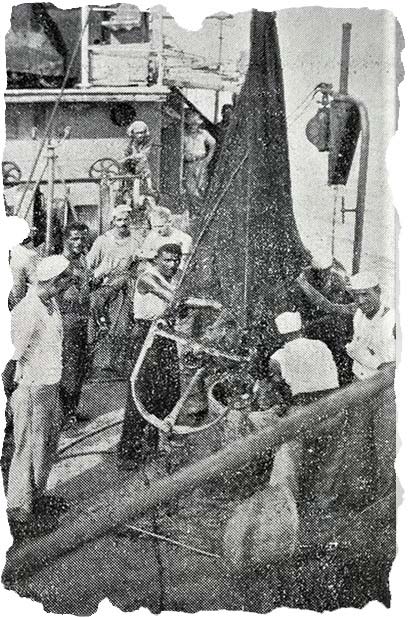
Gulf of Oman - December 8th
On the day of 8 December, Captain McKenzie, the thirtieth Commandant, informed them that they had arrived in the Gulf of Oman, where their new search area to the entrance to the Persian Gulf. Mabahiss spent a night in Muscat, Oman and when it arrived at a port, their workers ran to the nearest market to spend their money to buy extra food.
It took only two days to cross the Indian Ocean from India to Africa, across the Equator, in the largest search area to date. The number of stations thereafter exceeded 100.
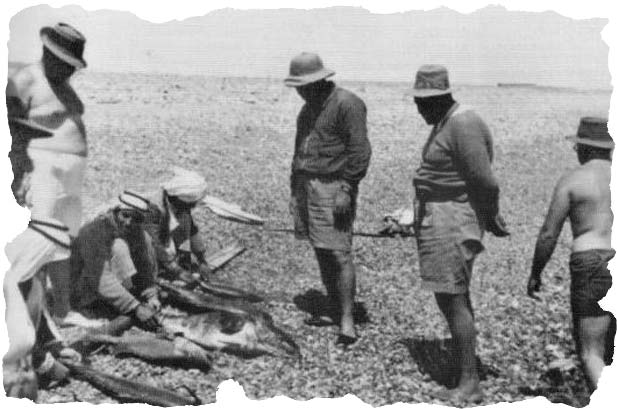
NAIROBI - 1 JANUARY
The voyage lasted 19 days until they arrived in Nairobi, Kenya. The sailors had to strain to raise the steam to the required degree; because the coal they were provided with at their last stop was bad. Also, The New Year came, and it was uncommon for any Egyptian to spend such times away from his family even at the sea.
They felt really strange every time they had an occasion, but what is interesting is the harmony between them and the England team. “Fawzi” mentioned that one day he heard from one of them the phrase, “Don't embarrass us in front of them” when was talking to his colleagues. At the same time, he knew that they were thinking about the promotion as the company promised them before they traveled. Therefore he informed the administration about that in all letters with them.
In those days, “Fawzi” was delighted that the expedition had obtained important scientific results, such as the study of sea layers up to 5,000 meters deep, as well as deep-sea organisms.
But their happiness didn’t last long, and the situation turned into one night. It is the night of January 16th.
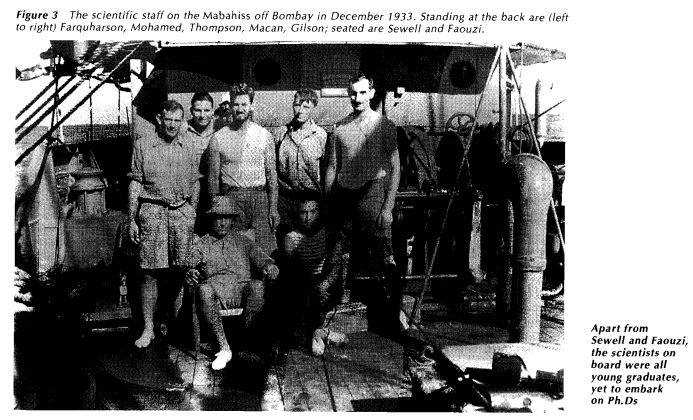
On that dark night, the disease hit Mabahiss and its crew was infected one by one. It all started with different-symptoms fevers. As “Fawzi” is the expedition’s doctor, he diagnosed one with malaria, suspected another, and did what he could to treat them. Two others were in critical condition, so that Fawzi asked the captain to quickly go to Zanzibar (Tanzania's Indian Ocean islands) for hospitalization.
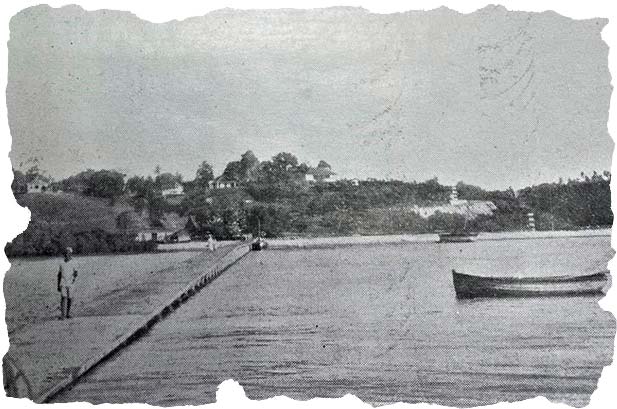
Zanzibar - 18 January
In a cold and unsteady sea, the ship's calm was broken while going to "Zanzibar", and the currents tightened on Mabahiss. Captain McKenzie used his experience and reduced its speed.
When they arrived, the sickness spread to others.
There, Sewell (the head of the expedition) took advantage of the stop and gave a lecture to a large audience, in which he spoke about the expedition and, of course, about Mabahiss. At the time, “Fawzi” wished that the expedition was only Egyptian, and they organized lectures and cinematic pictures about Egypt, as the Danish expedition did on the ship "Dana”, that he visited in Tunisia and heard a lecture about Denmark, not about the expedition.
After this lecture, they completed their work around the sea of this country.
The sea surprised them again after moving, one of the sailors got sick and had severe stomach pain. When they returned six days later to Zanzibar, he and three others were hospitalized. The case of this man was difficult, so “Fawzi” realized that even his condition improved, he could face another unresolved malaise at sea, as it might require surgery. So he decided to leave him until one of the contractors in the expedition returns him to Alexandria after his situation stabilized, and he told McKenzie to choose another man from Zanzibar.
This isn’t the only sailor lost when Mabahiss left Zanzibar, but another remains in hospital, and he will follow them to their next stop, Colombo (capital of Sri Lanka).
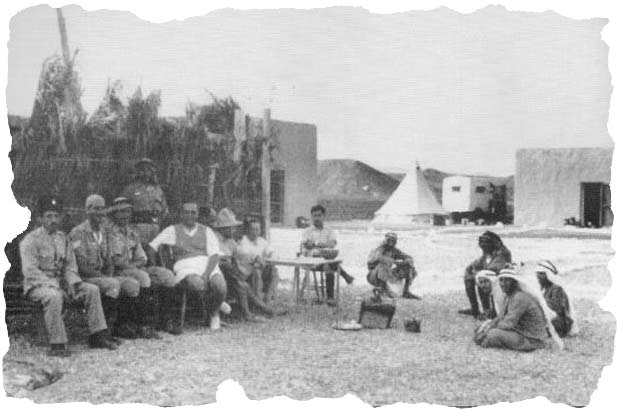
When the time of the next trip came, Anxiety filled the ship like a sudden emergency. It headed to Seychelles to get extra coal, and received "quinine salts" as a preventive treatment for malaria.
All of these preparations are there because they have another long journey in the middle of the ocean, as well as the wind will not be in their favor. After almost five months of work, Mabahiss is exhausted.
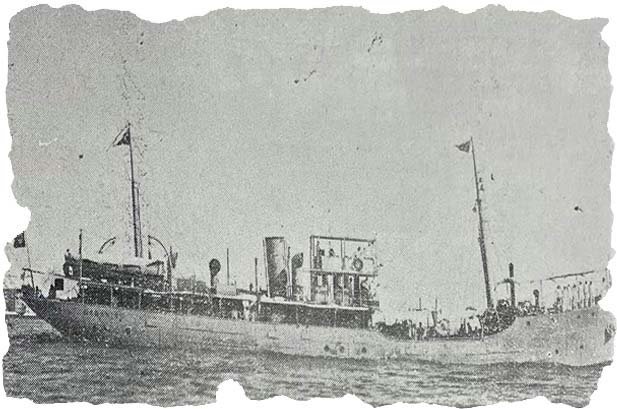
Colombo - 22 Feb
For the second time, Mabahiss crossed the Indian Ocean, and contrary to their predictions, all went peacefully and they were only disturbed by the winds during last days, but they arrived to Colombo. More importantly, they discovered a mountain range on the deep-sea during their route, this is the third time that the expedition discovered mountain barriers with a bathymetry device operated by Farkson (navigation officer).
While the patients' health improved and others recovered after weeks of rest in the city, the psychological state was poor.
One day, Hussein Fawzi walked toward the navy rooms as usual to inspect their condition. He talked to them, and they didn't succeed in hiding their distress at the poor possibilities and malnutrition. "Fawzi" was silent while listening to their conversations, and all seemed wasn’t surprising. Instead, he remembered the French warship that he saw in the port of Colombo when they arrived, and he noticed its salon, fitted with fans and tables.
He found himself comparing it to the Navy Rooms on Mabahiss, and he asked in his diary: “Would it have cost us a lot to supply them with some electric fans?”
